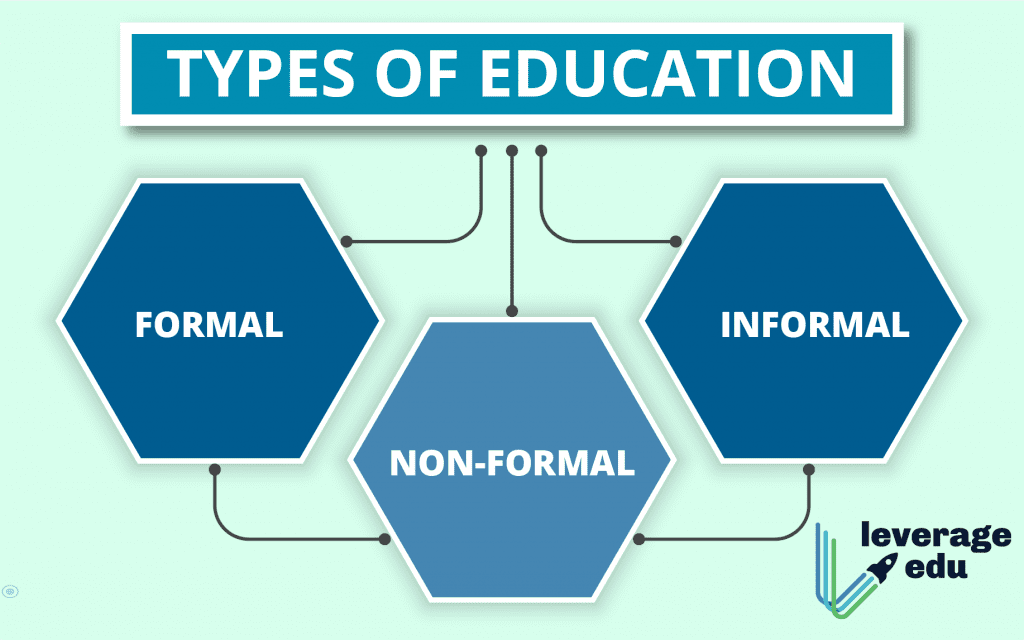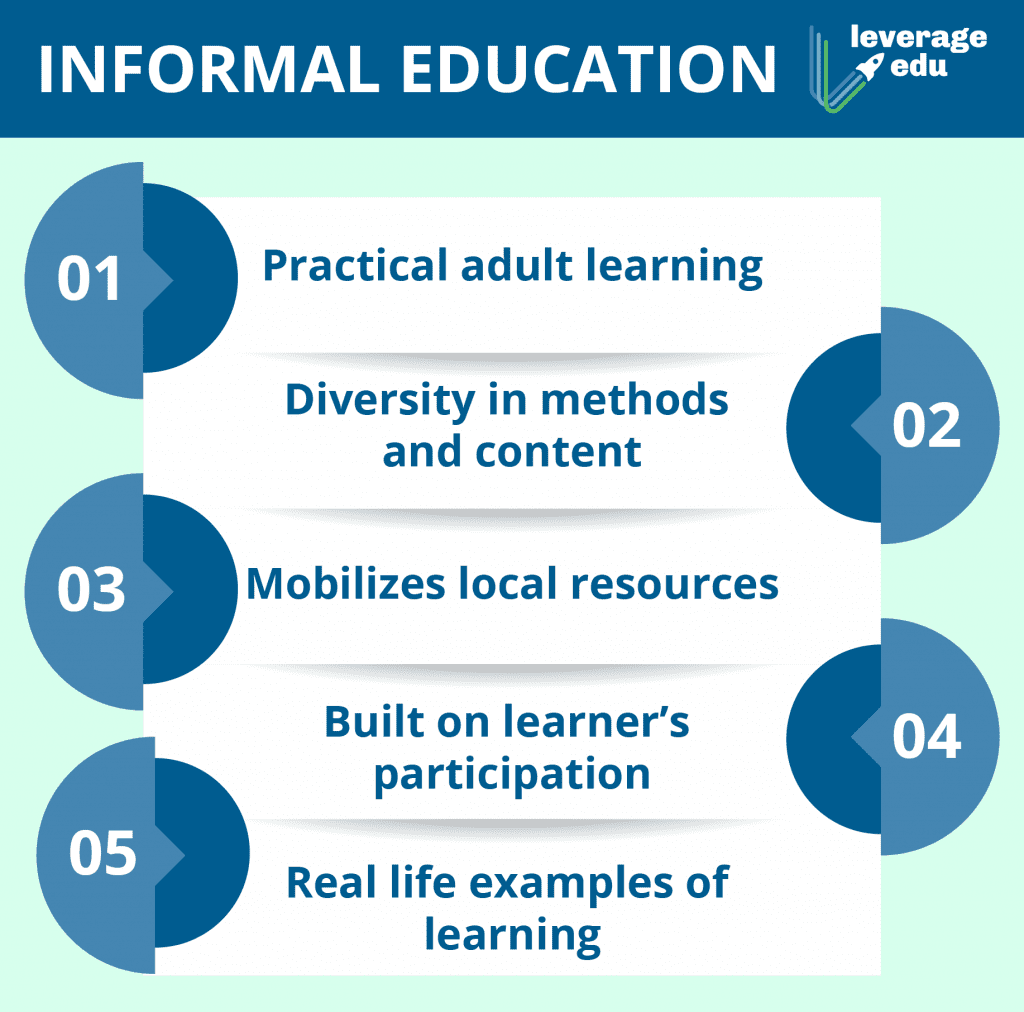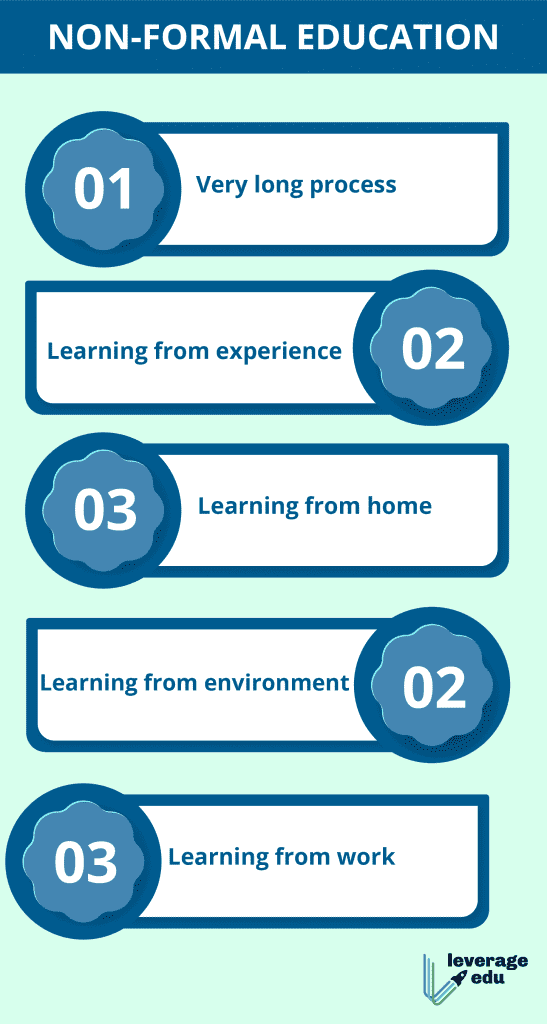Do the teachings from everyday experiences count as education or schools are the only places to attain it? The importance of Education is not only limited to the four walls of a classroom but can be explored through various other platforms and self-learning. Even though academic institutions like schools and colleges remain to be the prominent source of education but the learning process begins at home itself. Let us explore different types of education, through this blog!
This Blog Includes:
What is Education?
Education is a process of acquiring knowledge, skills, habits or values through various techniques like training, teaching, discussion, research, etc. It enables individuals with a sense of right and wrong. One can only prosper and achieve the set target if they have the right information, frame of mind and attitude. Also, education equips one with the right tools to gauge their ideas and interests as well as with skilful ways to express them.

Formal Types of Education
Formal Education refers to the basic mode of education which one generally comes across in schools. It can be regarded as a systematic way of attending a school or university and learning from the teachers using fundamental and instructional skills.
Be it any school, public or private only certified teachers who have qualifications in the chosen domain can provide formal education. Formal education starts at the elementary level and goes up to high school and beyond. Usually, in this setup teaching is curriculum-based and pre-determined.
Examples of Formal Education:
- Classroom Learning
- School certification/grading, college, and university degrees
- Planned education of different subjects that have a proper syllabus which is acquired by attending the institution.
Characteristics of Formal Education:
- It has a set grading system
- It is perfectly planned and has set course structures to follow
- In response to the teachings, proper fee payment is made every month
- Professional teachers are hired to teach the students
- The prescribed syllabus has to be finished in a pre-determined time duration
- Formal Education follows a hierarchical order of nursery to class 12th
Advantages of Formal Education
- The entire curriculum of formal education is usually organized and scheduled.
- Formal Education is delivered to students in a more systematic and structured way.
- The context included in the syllabus of formal education is the most basic knowledge that every student should acquire.
- The courses taught in formal education are ussually certifiend and recognized by a reputed board of education.
Disadvantages of Formal Education
- Because of the repetitive structure of the syllabus, it is very common for studnets to get bored of formal education.
- The struggle for scoring and extensive competition for better grades may effect the mental health of students.
- The courses in formal education is comparatively more costly.
- If the education system of the formal education is not an authorised one it may be a waste of money as the certificate has no value.

Check Out Objectives of Educational Technology!
Informal Type of Education
Whatever insightful information, skill, knowledge or craft you learn without the involvement of any well-structured classroom teaching can be categorized as an Informal type of education. Informal education starts as early as one is a toddler. Activities like how to eat food, how to drink water, how to wash your hands, sanitation etc are a few of the lessons which can be categorised under Inform learning. Informal education or learning is never limited to the classroom rather it is the type of knowledge one gains even without the intentions of learning. Some major examples of Informal education are a field trip to the museum or art gallery, various stages of homeschooling etc.
Examples of Informal Education:
- Teaching some basics of education like numeric characters.
- A person learning his/her mother-tongue.
- An instantaneous type of learning, “if a person standing in a bank learns about opening and maintaining the account at the bank from another individual.”
Characteristics of Informal Education:
- It is not planned and no time table is involved
- There is no syllabus involved
- One must learn randomly from any person as it is not compulsory to learn from a professional teacher
- There is no fee payment or charges involved in this method of learning
- Even learning through everyday experiences count as a casual learning
Advantages of Informal Education
- The process of informal education is ususally very natural that can happen anywhere and anytime.
- Uusally the courses taught in Informal Education required regualr practice and polisihing.
- Making it more flexible then other forms of education, there is no particular time duration for learning something under informal education.
- You do not require a professional to learn under informal education.
Disadvantages of Informal Education
- You might end up getting the wrong information if you don’t refer to a valid source
- You might end up taking a long time to learn a skill as it does not offer a certain time duration.
- Due to lack of a rigid structure, there is no proper discipline that is followed here.
- The end results are not well-defined or certified.

Non-Formal Type of Education
Non-Formal Education runs along the lines of Formal Education but is more flexible than it. It basically involves generic adult education, adult literacy or college equivalency preparations. Amongst the various types of education, it can be referred to as a balance between formal and informal education where there is intentional and pre-planned learning but there is no set curriculum that has to follow or is to be completed in a given time.
The most common set-up used to understand this non-formal learning is via a home tutor. In this situation, there is a teacher although not certified, a set syllabus has to be followed but there are relaxations to complete it, this is not unintentional learning rather one is aware of the act of learning.
Examples of Non-formal Education
- Non-formal education include programs such as swimming lessons.
- Programs promoting Fitness.
- Adult Education Courses that are Community Based.
- Some free courses for Adult Education that are organised by some organisation.
Characterisrics of Non-Formal Education
- It is not included in the core syllabus of the school system
- Highly flexible to adjust with student’s regular study structure.
- You can start a non-formal education at any time and age.
- Non-formal education can be both certified and uncertified.
- The education structure can be both part-time and full-time.
- The syllabus of a non-formal course ususally incorporates both theoretical and practical practices.
Advantages of Non-Formal Education
- Non-formal education system is usually open for both public and private domains.
- You don’t need to appear for regular exams in this form of education.
- Diplomas and certifcates here does not define your talent as it is only for skill development
- With skill development courses, this type pf education enciurages aspirants to use their theoretical knowledge for practical purposes.
Disadvantages of Non-Formal Education
- Usually without a teacher and a professional, there can be wrong information given away.
- No regular examinations take place which might detoriate student’s competency
- Unrecognized instituions may get you fake certifications of no value.

Find Out Different Models of Communication!
Apart from these popular types of education, Special Education is one popular type. As reflected by the name, the general notion that people assume of this type of education is teaching the children with disabilities. But it is assisting the students who struggle to match up with the pace of learning in school or college.
Related Reads:-
FAQs
1- What is formal informal and nonformal education?
Formal Education:- Formal Education refers to the basic mode of education which one generally comes across in schools. It can be regarded as a systematic way of attending a school or university and learning from the teachers using fundamental and instructional skills.
Informal Education:- Insightful information, skill, knowledge or craft you learn without the involvement of any well-structured classroom teaching can be categorized as an Informal type of education. Informal education starts as early as one is a toddler.
Non-Formal Education:- Non-Formal Education runs along the lines of Formal Education but is more flexible than it. It basically involves generic adult education, adult literacy or college equivalency preparations. Amongst the various types of education, it can be referred to as a balance between formal and informal education where there is intentional and pre-planned learning but there is no set curriculum that has to follow or is to be completed in a given time.
2- Who is the father of the education?
The Father of Education is Johann Heinrich Pestalozzi.
3- What is the full form of education?
E – Energy, D – Discipline, U – Unity, C – Confidence, A – Aim, T – Talent, I – Interest, O – Opportunity, N – Nationality, This is the full form of EDUCATION.
We hope that after going through this blog, you are now aware of different types of education. If you want to establish your career abroad, reach out to Leverage Edu and we will help you with the ways of doing the same. To know more book a free counselling session with us!

 One app for all your study abroad needs
One app for all your study abroad needs




















 45,000+ students realised their study abroad dream with us. Take the first step today.
45,000+ students realised their study abroad dream with us. Take the first step today.

